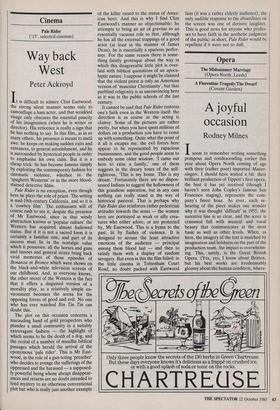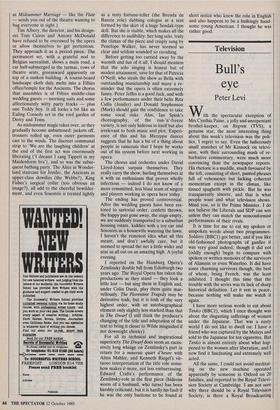Opera
A joyful occasion
Rodney Milnes
Iseem to remember writing something pompous and condescending earlier this year about Opera North coming of age with their (rather poor) imported Master- singers. I should have waited a bit: their brilliant production of Tippett's first opera, the best it has yet received (though I haven't seen John Copley's famous San Francisco staging), represents the com- pany's finest hour. As ever, each re- hearing of the piece makes one wonder why it was thought 'difficult' in 1955; the narrative line is so clear, and the score is crammed full with musical and vocal beauty that communicates at the most basic as well as other levels. When, as here, the imagery of the text is matched by imagination and boldness on the part of the production team, the impact is overwhelm- ing. This, surely, is the Great British Opera. (Yes, yes, I know about Britten, but his best works are irredeemably gloomy about the human condition, where- as Midsummer Marriage — like the Flute — sends you out of the theatre wanting to hug everyone in sight.) Tim Albery, the director, and his design- ers Tom Cairns and Antony McDonald have refused to be overawed by the opera or allow themselves to get portentous. They approach it as a period piece. The permanent set, with a grateful nod to Belgian surrealism, shows a main road, a car half-submerged in the tarmac, rows of theatre seats, greensward apparently on top of a sunken building. A tourist-board landscape cloth duly melts into a Fifties office/temple for the Ancients. The chorus that assembles is of Fifties middle-class wedding guests — morning suits and some affectionately witty party frocks — plus one Teddy boy. It all looks a bit like an Ealing Comedy set in the roof garden of Derry and Toms.
As midsummer magic takes over, so they gradually become unbuttoned: jackets off, trousers rolled up, even outer garments cast to the winds. The discreet communal strip to 'We are the laughing children' at the end of the first act was enormously liberating CI dreamt I sang Tippett in my Maidenform bra'), and so was the subse- quent bathing party. The Alice in Wonder- land staircase for Jenifer, the Ancients as upper-class dowdies (the Webbs?), King Fisher's surgical collar (too obvious an image?), all add to the cheerful bewilder- ment, and even Sosostris is treated lightly as a testy fortune-teller (the Brenda de Banzie role) dabbing cologne in a tent formed by the skirt of a huge Sendak-type doll. But she is visible, which makes all the difference to audibility: her long solo, truly the climax of the piece and crisply sung by Penelope Walker, has never seemed so clear and seldom sounded so ravishing.
Before getting too carried away by the warmth and fun of it all, I should mention that the solo singing is honest but of modest attainment, save for that of Patricia O'Neill, who steals the show as Bella with outstanding musicianship and many a re- minder that the opera is often extremely funny. Peter Jeffes is a good Jack, and with a few performances under their belts Rita Cullis (Jenifer) and Donald Stephenson (Mark) should gain the confidence to take some vocal risks. Alas, Ian Spink's choreography, of the run-'n'-freeze variety, is not only hideous in itself but also irrelevant to both music and plot. Experi- ence of this and his Mazeppa dances suggests that he has a bit of a thing about people in raincoats that I hope he works out of his system before next working in opera.
The chorus and orchestra under David Lloyd-Jones surpass themselves. They really carry the show, hurling themselves at it with an enthusiasm that proves wholly infectious — indeed I do not know of a more committed, less blasé team of singers and players working in opera here today.
The ending has proved controversial. After the wedding guests have been res- tored to sartorial order, confetti thrown, the happy pair gone away, the stage empty, we are suddenly transported to a suburban housing estate, kiddies with a toy car and Sosostris as a housewife watering the lawn. I haven't the remotest idea what all this meant, and don't awfully care, but it seemed to spread the net a little wider and sent us all out on an amazing high. A joyful evening.
I reported on the Hamburg Opera's Zemlinsky double bill from Edinburgh two years ago. The Royal Opera has taken the productions as they stand — they look a little lost — but sing them in English and, under Colin Davis, play them quite mar- vellously. The Florentine Tragedy may be derivative tosh, but it is tosh of the very highest order, with an autobiographical element only slightly less marked than that in The Dwarf (I still think the producer's changing of the title and adaptation of the text to bring it closer to Wilde misguided if not downright cheeky).
For all its technical and inspirational superiority The Dwarf does seem an exces- sively long whinge on Zemlinsky's part in return for a mauvais quart d'heure with Alma Mahler, and Kenneth Riegel's vir- tuoso interpretation of the title role some- how makes it more, not less embarrassing. Edward Crafts's performance of the Zemlinsky-role in the first piece (hideous worm of a husband, who turns) has been harshly criticised, but it is hardly his fault if he was the only baritone to be found at short notice who knew the role in English and also happens to be a hulkingly hand- some young American. I thought he was rather good.























































 Previous page
Previous page